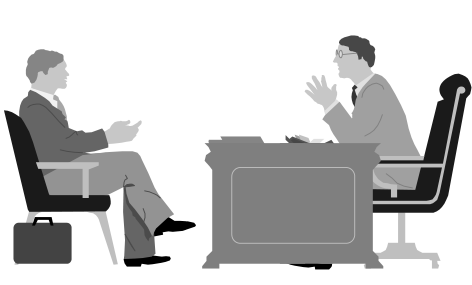The interview is the most widely used selection step and in some companies it comprises the entire selection system. Some personnel experts criticize the interview as an unreliable tool, but it is an effective way to obtain certain information. No other method is quite so satisfactory in judging an individual as to ability in oral communication, personal appearance and manners, attitude toward selling and life in general, reaction to obstacles presented face to face, and personal impact upon others.
Good interviewers avoid covering the same ground as other selection devices. The interviewer reviews the completed application form before the interview and refrains from asking questions already answered. Perusal of the completed application indicates areas that require further questioning.
It is important to sell the applicant on the company, but there are more efficient ways of accomplishing this than through personal interviewing. One is by providing the applicant with a recruiting brochure. Another may be used when several applicants are to be interviewed consecutively, as in college recruiting: the interviewer meets with the whole group and describes general company policies. But it is still necessary to answer questions during interviews.
The job interview can be a trying experience for the applicant. Even for experienced salespersons accustomed to selling themselves and their products daily to strangers, the great importance attached to a job change and the unfamiliarity of the situation may cause nervousness. One way to relieve tension is for the interviewer to begin with questions on the person’s family and educational background, subjects about which most people talk freely. One of the interviewer’s tasks is to persuade the applicant that the firm is a desirable employer. Throughout the interview, pleasant rapport between interviewer and job applicant should be maintained.
Questions during Interviewing
The Questions asked to the applicant should reflect the following:
Attitude: Ever lose in competition? Feelings? How do you handle customer complaints?
Motivation: How will this job help you get what you want? What obstacles are most likely to trip you up?
Initiative: How do you feel about working alone? How did you get into sales?
Stability: What things disturb you most? What is your most pleasant work experience?
Planning: Give me an idea of how you spend a typical day.
Insight: Tell me about your strengths and weaknesses. How would you size up your last employer?
Social skills: What kind of customer (person) do you get along with best? What methods are effective for dealing with people?
Interviewing Techniques
Let us study about the various interviewing techniques. Many companies provide specialized training for those doing interviewing. Scientifically designed rating scales and interview record forms help interviewers to guide discussions along productive lines. Interviews have become increasingly important sources of information about applicants and their reactions. The informal, unplanned interview has been giving way in most companies to newer techniques, some of which are described here.

Patterned Interview: Here the interviewer uses a prepared outline of questions designed to elicit a basic core of information. The interviewer may work directly from the outline, recording answers as they are given, but this may make the conversation stilted and the applicant nervous. Greater spontaneity results when the interviewer memorizes the outline and records the answers after the interview.
Nondirective Interview: In this technique the applicant is encouraged to speak freely about his or her experience, training, and future plans. The interviewer asks few direct questions and says only enough to keep the interviewee talking. The nondirective interview does not prairies answers to standard questions, and much time is spent on outwardly irrelevant subjects. Some personnel experts say that a nondirective technique yields maximum insight into an individual’s attitudes and interests. Expert interpretation reveals much about the applicant often including things of which the individual is not consciously aware. This technique’s proponents claim that it is the best method for probing an individual’s personality in depth. The main drawback is that administering the interview and interpreting the _results demand specialized instruction.
Interaction (stress) Interview: The interaction interview simulates the stresses the applicant would meet in actual selling and provides a way to observe the applicant’s reactions to them’. This interviewing technique has long been used by sales executives who, in interviewing prospective sales personnel, hand the applicant an ashtray or other object and say “Here, sell this to me.” The objective is to see how the applicant reacts to the surprise situation and to size up selling ability.
Interaction interviewing has become a more complex, and sophisticated, technique. In one version, two, interviewers are require done uses psychological techniques to set up ‘the simulated situations, and the other, who is present but not an active participant in the interview observes and records the applicant’s reactions. Because of their subtlety, the delicacy involved in their application, and the importance of expert interpretation, the newer kind of interaction interviews should be planned, administered, and interpreted by a trained psychologist.
Rating Scales: One shortcoming of the personal interview is its tendency to lack objectivity, a defect that is reduced through rating scales.
These are so constructed that interviewers’ ratings are channeled into a limited choice of responses. In evaluating an applicant’s general appearance, for instance, one much used form forces an interviewer to choose one of five descriptive phrases: very neat, nicely dressed, presentable, untidy, and slovenly. Experience indicates that this results in more comparable ratings of the same individual by different interviewers. One drawback of the rating scale is that its objectivity restricts precise description of many personal qualities. It is good practice to encourage interviewers to explain ratings in writing.

